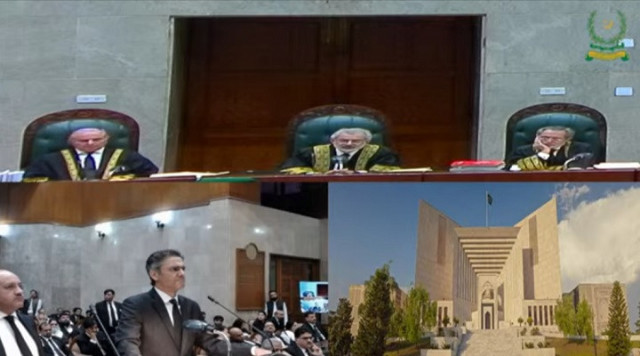SC slams pushing judiciary on one’s whims
In IHC letter case, Justice Minallah notes security apparatus ‘interfering’ in judges’ affairs for 76 years

The Supreme Court observed on Tuesday that the federal government or intelligence agencies could submit a reply to the court if they wanted, but declared that pushing the judiciary to their own path was also “interference”.
A six-member larger bench led by Chief Justice of Pakistan Qazi Faez Isa heard the suo motu notice case in connection with a letter penned by six Islamabad High Court (IHC) judges, alleging that the country’s spy agencies were interfering in their functions.
Justice Naeem Akhtar Afghan, a member of the bench, noted that there were three intelligence agencies in the country. He sought the details in the next hearing of the legislation through which these agencies were formed and under which law they operated.
During the proceedings, not only the judges made interesting observations about the previous history of the intelligence agencies’ “interference” in the judicial affairs, but conflicting opinions came out as well.
Justice Athar Minallah noted that this had been happening between the judiciary and the security apparatus for 76 years. He added that it was the responsibility of the state to protect the judges and the independence of the judiciary.
However, Chief Justice Isa disagreed with this “theory”, maintaining that such a culture did not exist in the country. “If I cannot deliver correct judgments in accordance with the Constitution and the law despite interference or pressure, then I should go home.”
The chief justice further observed that he had served as the Balochistan High Court chief justice for more than five years and during that time, the biggest threat came from the Supreme Court. The top judge continued that he should not be taken into the context of 76 years of judicial history.
Justice Minallah observed that he had also served as the IHC chief justice for four years and there was no “interference” during his tenure. Justice Mansoor Ali Shah also remarked that nobody had interfered in his judicial affairs so far.
Justice Jamal Khan Mandokhail pointed out that this meant that it was limited to a specific judge. Justice Musarrat Hilali noted that those who could not put up with pressure had no right to be judges.
Justice Shah observed that today the Supreme Court judges had a golden opportunity to set the rules. However, he regretted that the high courts did not exercise their power of contempt. Justice Hilali concurred, noting that why could the IHC judges not act themselves on what they wrote in the letter and asking the top court to take action.
Justice Minallah highlighted that if a judge showed courage, a reference came out against them. “If we ourselves don’t open our doors to the people, nothing will happen.” The judge noted that an online campaign was run against a judge with his personal data, apparently referring to IHC’s Justice Babar Sattar.
“A joint investigation team [JIT] was formed for the judiciary that sent 31 notices. If nothing happened even after that, this collusion is proved yet again”.
The chief justice observed that the reference came to the judiciary, and not the intelligence agencies. “We decide the references. We also impose fines and we made the decision in the case of [former] Justice Aziz Siddiqui.”
On the issue of a full court, Chief Justice Isa explained that the three-member committee had decided to form a bench that consisted of all available judges. He added that Justice Yahya Afridi had left the bench and two other judges were not available for the full court.
The top judge asked Attorney General for Pakistan (AGP) Mansoor Usman Awan if he had read the proposals put forward by the IHC judges in their letter. The AGP replied in the negative. Justice Minallah noted that these were not proposals, but a charge sheet.
The chief justice noted that these proposals should be made public after which he told the AGP to read them to the court. After the AGP finished reading the proposals, Justice Shah remarked that the judges of the Lahore High Court (LHC) had also pointed that the interference in the judiciary was an open secret. “Now the judges are looking towards the Supreme Court.”
The chief justice noted that interference could also happen internally. “Can CJP call a judge and tell him to what decision to make [in a case]?” He went to remark that the AGP could point his finger at the judges that their conduct was equivalent to interference in the judiciary. “Any kind of interference should be remedied. The judiciary must be self-accountable.”
Read CJ ‘unaware’ of any new meddling incident
The chief justice remarked that he would never accept any interference from any source and there had not been a single complaint to him or the SC registrar since his taking over of his current office. He inquired if it amounted to interference when the presidents of the lower judiciary’s bar associations forced their way into the judges’ chambers.
Addressing the AGP, Justice Minallah noted that during a news conference after the meeting between him, Chief Justice Isa and Prime Minister Shehbaz Sharif, the IHC judges’ letter was termed “misconduct”. The AGP replied that it was wrong if their letter was described as “misconduct”.
He later said that he had confirmed that the word “misconduct” was not used during the news conference. Subsequently, the court adjourned the hearing till May 7, ordering the petitioners—the lawyers’ bodies—to submit a response by then. It added that it would be appropriate if the response was unanimous.



















COMMENTS
Comments are moderated and generally will be posted if they are on-topic and not abusive.
For more information, please see our Comments FAQ